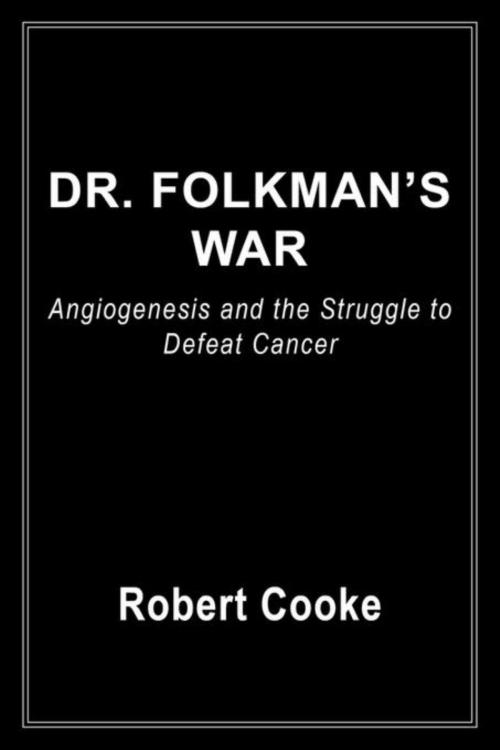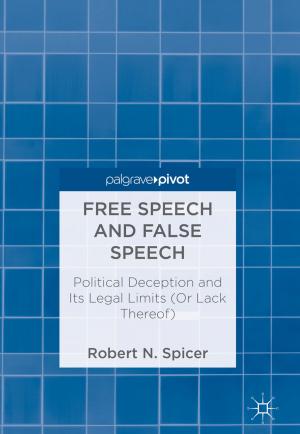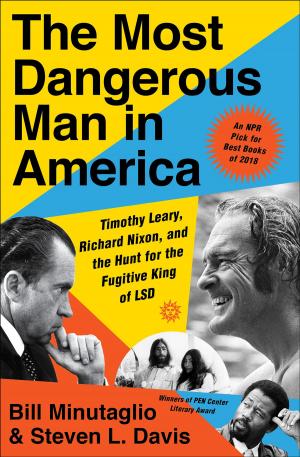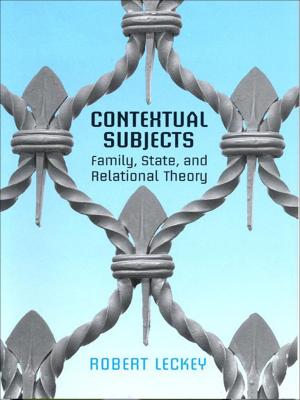| Author: | Robert Cooke | ISBN: | 9780786755189 |
| Publisher: | Sanford J. Greenburger Associates | Publication: | November 19, 2013 |
| Imprint: | Sanford J. Greenburger Associates | Language: | English |
| Author: | Robert Cooke |
| ISBN: | 9780786755189 |
| Publisher: | Sanford J. Greenburger Associates |
| Publication: | November 19, 2013 |
| Imprint: | Sanford J. Greenburger Associates |
| Language: | English |
In 1961, twenty-eight-year-old Dr. Judah Folkman saw something while doing medical research in a United States navy lab that gave him the first glimmering of a wild, inspired hunch. What if cancerous tumors, in order to expand, needed to trigger the growth of new blood vessels to feed themselves? And if that was true, what if a way could be found to stop that growth? Could cancers be starved to death? Dr. Folkman had ample reason to be self confident - second in his class at Harvard Medical School, he was already considered one of the most promising doctors of his generation. But even he never guessed that his idea would eventually grow into a multibillion-dollar industry that is now racing through human trials with drugs that show unparalleled promise of being able to control cancer, as well as other deadly diseases.
For the creation of this book, Dr. Judah Folkman cooperated fully and exclusively with acclaimed science writer Robert Cooke. He granted Cooke unlimited interviews, showed him diaries and personal papers, and threw open the doors of his lab. The result is an astonishingly rich and candid chronicle of one of the most significant medical discoveries of our time and of the man whose vision and persistence almost single-handedly has made it possible.
Dr. Folkman's radical new way of thinking about cancer was once considered preposterous. So little was known about how cancer spreads and how blood vessels grow that he wasn't even taken seriously enough to be considered a heretic. Other doctors shook their heads at the waste of a great mind, and ambitious young medical researchers were told that accepting a position in Folkman's lab would be the death of their careers. Now, though, the overwhelming majority of experts believes that the day will soon come when antiangiogenesis therapy supplants the current more toxic and less-effective treatments - chemotherapy, radiation, and surgery-as the preferred method of treatment for cancer in patients around the world, and Dr. Folkman's breakthrough will come to be taken for granted the way we now take for granted the polio vaccine and antibiotics.
REVIEWS
Dr. Folkman's War brilliantly describes how high the odds are against success in medical research, how vicious the competition for grants, how entrenched the skepticism about any genuinely original thinking, how polluted by politics and commerce the process of getting medicine into patients' hands. But it also depicts with rare power how exalted a calling medicine can be and how for the rare few-the brilliant, the tireless, and the lucky - the results of success can be world-changing.
"Judah Folkman's answer-stop cancers by cutting off their blood supplies-has much too long been thought of as too simple to ever work. Now, however, a broad set of antiangiogenic agents based on Judah's ideas are coming on line. The verdict 'cancer' need no longer be synonymous with fear and despair. Our country's 'war against cancer' at last has found its general."
-JAMES D. WATSON, winner of the Nobel Prize and author of The Double Helix
"It is said that genius disdains the beaten path, and that's certainly true of Dr. Judah Folkman. He has suffered for it, but his imagination, his persistence-and yes, his glorious obsession-will benefit us all. We owe him our boundless gratitude."
-JONATHAN HARR, author of A Civil Action
"Rarely in the history of modem biomedical research has a major advance been attributable directly to the energies and vision of a single individual. This is such a story, about one man's vision, drive, indeed obsession with an idea that will one day dramatically change cancer therapy."
-ROBERT A. WEINBERG, Whitehead Institute for Biomedical Research and MIT, author of One Renegade Cell: How Cancer Begins and Racing to the Beginning of the Road: The Search for the Origin of Cancer
For the creation of this book, Dr. Judah Folkman cooperated fully and exclusively with acclaimed science writer Robert Cooke. He granted Cooke unlimited interviews, showed him diaries and personal papers, and threw open the doors of his lab. The result is an astonishingly rich and candid chronicle of one of the most significant medical discoveries of our time and of the man whose vision and persistence almost single-handedly has made it possible.
Dr. Folkman's radical new way of thinking about cancer was once considered preposterous. So little was known about how cancer spreads and how blood vessels grow that he wasn't even taken seriously enough to be considered a heretic. Other doctors shook their heads at the waste of a great mind, and ambitious young medical researchers were told that accepting a position in Folkman's lab would be the death of their careers. Now, though, the overwhelming majority of experts believes that the day will soon come when antiangiogenesis therapy supplants the current more toxic and less-effective treatments - chemotherapy, radiation, and surgery-as the preferred method of treatment for cancer in patients around the world, and Dr. Folkman's breakthrough will come to be taken for granted the way we now take for granted the polio vaccine and antibiotics.
REVIEWS
Dr. Folkman's War brilliantly describes how high the odds are against success in medical research, how vicious the competition for grants, how entrenched the skepticism about any genuinely original thinking, how polluted by politics and commerce the process of getting medicine into patients' hands. But it also depicts with rare power how exalted a calling medicine can be and how for the rare few-the brilliant, the tireless, and the lucky - the results of success can be world-changing.
"Judah Folkman's answer-stop cancers by cutting off their blood supplies-has much too long been thought of as too simple to ever work. Now, however, a broad set of antiangiogenic agents based on Judah's ideas are coming on line. The verdict 'cancer' need no longer be synonymous with fear and despair. Our country's 'war against cancer' at last has found its general."
-JAMES D. WATSON, winner of the Nobel Prize and author of The Double Helix
"It is said that genius disdains the beaten path, and that's certainly true of Dr. Judah Folkman. He has suffered for it, but his imagination, his persistence-and yes, his glorious obsession-will benefit us all. We owe him our boundless gratitude."
-JONATHAN HARR, author of A Civil Action
"Rarely in the history of modem biomedical research has a major advance been attributable directly to the energies and vision of a single individual. This is such a story, about one man's vision, drive, indeed obsession with an idea that will one day dramatically change cancer therapy."
-ROBERT A. WEINBERG, Whitehead Institute for Biomedical Research and MIT, author of One Renegade Cell: How Cancer Begins and Racing to the Beginning of the Road: The Search for the Origin of Cancer
In 1961, twenty-eight-year-old Dr. Judah Folkman saw something while doing medical research in a United States navy lab that gave him the first glimmering of a wild, inspired hunch. What if cancerous tumors, in order to expand, needed to trigger the growth of new blood vessels to feed themselves? And if that was true, what if a way could be found to stop that growth? Could cancers be starved to death? Dr. Folkman had ample reason to be self confident - second in his class at Harvard Medical School, he was already considered one of the most promising doctors of his generation. But even he never guessed that his idea would eventually grow into a multibillion-dollar industry that is now racing through human trials with drugs that show unparalleled promise of being able to control cancer, as well as other deadly diseases.
For the creation of this book, Dr. Judah Folkman cooperated fully and exclusively with acclaimed science writer Robert Cooke. He granted Cooke unlimited interviews, showed him diaries and personal papers, and threw open the doors of his lab. The result is an astonishingly rich and candid chronicle of one of the most significant medical discoveries of our time and of the man whose vision and persistence almost single-handedly has made it possible.
Dr. Folkman's radical new way of thinking about cancer was once considered preposterous. So little was known about how cancer spreads and how blood vessels grow that he wasn't even taken seriously enough to be considered a heretic. Other doctors shook their heads at the waste of a great mind, and ambitious young medical researchers were told that accepting a position in Folkman's lab would be the death of their careers. Now, though, the overwhelming majority of experts believes that the day will soon come when antiangiogenesis therapy supplants the current more toxic and less-effective treatments - chemotherapy, radiation, and surgery-as the preferred method of treatment for cancer in patients around the world, and Dr. Folkman's breakthrough will come to be taken for granted the way we now take for granted the polio vaccine and antibiotics.
REVIEWS
Dr. Folkman's War brilliantly describes how high the odds are against success in medical research, how vicious the competition for grants, how entrenched the skepticism about any genuinely original thinking, how polluted by politics and commerce the process of getting medicine into patients' hands. But it also depicts with rare power how exalted a calling medicine can be and how for the rare few-the brilliant, the tireless, and the lucky - the results of success can be world-changing.
"Judah Folkman's answer-stop cancers by cutting off their blood supplies-has much too long been thought of as too simple to ever work. Now, however, a broad set of antiangiogenic agents based on Judah's ideas are coming on line. The verdict 'cancer' need no longer be synonymous with fear and despair. Our country's 'war against cancer' at last has found its general."
-JAMES D. WATSON, winner of the Nobel Prize and author of The Double Helix
"It is said that genius disdains the beaten path, and that's certainly true of Dr. Judah Folkman. He has suffered for it, but his imagination, his persistence-and yes, his glorious obsession-will benefit us all. We owe him our boundless gratitude."
-JONATHAN HARR, author of A Civil Action
"Rarely in the history of modem biomedical research has a major advance been attributable directly to the energies and vision of a single individual. This is such a story, about one man's vision, drive, indeed obsession with an idea that will one day dramatically change cancer therapy."
-ROBERT A. WEINBERG, Whitehead Institute for Biomedical Research and MIT, author of One Renegade Cell: How Cancer Begins and Racing to the Beginning of the Road: The Search for the Origin of Cancer
For the creation of this book, Dr. Judah Folkman cooperated fully and exclusively with acclaimed science writer Robert Cooke. He granted Cooke unlimited interviews, showed him diaries and personal papers, and threw open the doors of his lab. The result is an astonishingly rich and candid chronicle of one of the most significant medical discoveries of our time and of the man whose vision and persistence almost single-handedly has made it possible.
Dr. Folkman's radical new way of thinking about cancer was once considered preposterous. So little was known about how cancer spreads and how blood vessels grow that he wasn't even taken seriously enough to be considered a heretic. Other doctors shook their heads at the waste of a great mind, and ambitious young medical researchers were told that accepting a position in Folkman's lab would be the death of their careers. Now, though, the overwhelming majority of experts believes that the day will soon come when antiangiogenesis therapy supplants the current more toxic and less-effective treatments - chemotherapy, radiation, and surgery-as the preferred method of treatment for cancer in patients around the world, and Dr. Folkman's breakthrough will come to be taken for granted the way we now take for granted the polio vaccine and antibiotics.
REVIEWS
Dr. Folkman's War brilliantly describes how high the odds are against success in medical research, how vicious the competition for grants, how entrenched the skepticism about any genuinely original thinking, how polluted by politics and commerce the process of getting medicine into patients' hands. But it also depicts with rare power how exalted a calling medicine can be and how for the rare few-the brilliant, the tireless, and the lucky - the results of success can be world-changing.
"Judah Folkman's answer-stop cancers by cutting off their blood supplies-has much too long been thought of as too simple to ever work. Now, however, a broad set of antiangiogenic agents based on Judah's ideas are coming on line. The verdict 'cancer' need no longer be synonymous with fear and despair. Our country's 'war against cancer' at last has found its general."
-JAMES D. WATSON, winner of the Nobel Prize and author of The Double Helix
"It is said that genius disdains the beaten path, and that's certainly true of Dr. Judah Folkman. He has suffered for it, but his imagination, his persistence-and yes, his glorious obsession-will benefit us all. We owe him our boundless gratitude."
-JONATHAN HARR, author of A Civil Action
"Rarely in the history of modem biomedical research has a major advance been attributable directly to the energies and vision of a single individual. This is such a story, about one man's vision, drive, indeed obsession with an idea that will one day dramatically change cancer therapy."
-ROBERT A. WEINBERG, Whitehead Institute for Biomedical Research and MIT, author of One Renegade Cell: How Cancer Begins and Racing to the Beginning of the Road: The Search for the Origin of Cancer















